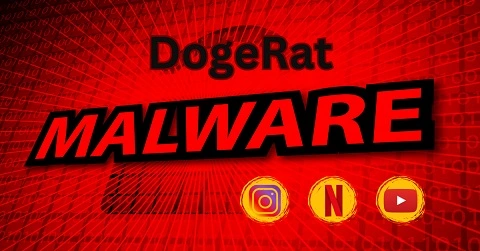Alert: DogeRAT Malware Poses Threat! Counterfeit Netflix, YouTube, and Instagram Apps Endanger Data Security – Full Details.

A new and alarming malware campaign has surfaced, utilizing deceptive applications that masquerade as popular platforms such as YouTube, Netflix, Instagram, Opera Mini, and more. This campaign, identified as DogeRAT (Remote Access Trojan) by cybersecurity experts at CloudSEK, utilizes open-source Android malware to extract sensitive information from affected devices. The stolen data includes contacts, messages, and even banking credentials, posing a significant threat to the security of unsuspecting victims.
CloudSEK has released a statement disclosing the capabilities of DogeRAT, revealing its ability to take control of compromised devices. This malicious software empowers attackers to engage in various harmful activities, including sending spam messages, unauthorized transactions, manipulating files, and even remotely capturing photos using the device's cameras. To propagate the malware, cybercriminals primarily rely on social media platforms, distributing it through shared links in direct messages, spam comments on posts, and messaging apps.
CloudSEK further highlighted that the individual responsible for the malware has established a GitHub repository, which serves as a hosting platform for the RAT. The repository includes a comprehensive list of features and capabilities, accompanied by a video tutorial. Anshuman Das, a threat intelligence researcher at CloudSEK, emphasized that scammers are not solely reliant on phishing websites. They also engage in distributing modified RATs or repurposing malicious applications to orchestrate scam campaigns that are both cost-effective and straightforward to set up, while generating substantial profits. Das further emphasized that this campaign serves as a striking reminder of the financial incentives that drive scammers to constantly refine their tactics. CloudSEK's findings indicate that threat actors are actively creating counterfeit banking, e-commerce, and entertainment apps to deceive unsuspecting individuals.
How does the malware work?
DogeRAT establishes communication with a Command and Control (C2) panel by utilizing a Telegram Bot, which serves as the interface for threat actors to remotely manage and control the compromised devices. To facilitate this communication, the RAT utilizes a Java-based server-side code written in NodeJs. Furthermore, the malware incorporates a web view within the application, displaying the URL of the targeted entity to create a false sense of legitimacy.
During installation, DogeRAT requests various permissions, mirroring those commonly required by legitimate apps. These permissions include access to call logs, audio recording, and the ability to read SMS messages, media, and photos.
The Remote Access Trojan (RAT) utilizes a blend of readily available open-source technologies, enabling threat actors to effortlessly initiate fraudulent campaigns.
Here are essential steps to ensure the safety of your data and device.
Ensure caution when interacting with links and attachments. Refrain from clicking or opening them if they are received from unfamiliar sources. Limit app downloads to reputable sources like the Google Play Store for Android or the App Store for iPhones.
Regularly update your software to benefit from security patches that safeguard your device against malware.
Employ a reliable security solution to effectively shield your device from malware and other potential threats.
Stay vigilant for signs of scams, including tactics like urgency, fear, and greed used by scammers. When uncertain about a message or offer, prioritize caution and refrain from clicking on links or opening attachments.
Take the initiative to educate yourself about malware. Increasing your knowledge about malware equips you with better tools to identify and protect yourself against it. Numerous online resources are available to expand your understanding of malware.

